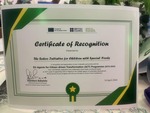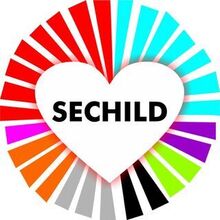The Sedoo Initiative for Children.with Special Needs-SECHILD
Unverified non-profit organisation
The Sedoo Initiative for Children with Special Needs- SECHILD is a not-for-profit, community-driven development and non-governmental charitable organization established in January,2011 committed to an often-neglected target group within the Nigerian society: vulnerable children/persons with special needs/disabilities offering non-profit programs that focus on improving the lives of children with special needs and individuals with disabilities. The organization is registered in Nigeria by the Corporate Affairs Commission under Part “C” of the Companies and Allied Matters Act 1990 with RC No. 42610.
Although SECHILD emerged in response to a couple’s search for rehabilitation, physio/occupational therapy, support, advocacy, intervention, care and information centers for nursing TWO children born with some form of brain malfunction coupled with the absence of professional assistance and support centers for the specific condition of these children and the desire to establish an institution for similar children with the reservoir that comprehensively serves them, over the years, the initiative has expanded to Advocacy for persons with Disability, Special Educational Needs, Disability and Mental Health Support and Disability and Gender Based Violence.
SECHILD is registered with Federal Ministries of Health, Education, Women Affairs and Social Development, National Human Rights, NACRAN, NACTAL, WASH and is a recipient of many awards namely, Inner wheel Club, Woman on Fire Makurdi, Rotaract Club, Red Cross, Ontiv Professionals Association and Woman on Fire Abuja.
Since 2011 SECHILD has impacted directly and indirectly over 500 lives positively across Nigeria through her interventions in Advocacy for Disabled Children/Persons, Special Educational Needs, Rehabilitation, Intervention Support Programmes, Disability and Mental Health Support, Disability and Gender Based Violence.
Our Strategic Objectives
• To advocate for the rights of children with special needs and persons with disabilities
• To provide and promote better delivery of special educational services/ development of children with special needs and persons with disabilities for more effective intellectual growth to create opportunities for self-actualization through sponsorships and trainings
• To provide shelter and rehabilitation for children with special needs and persons with disabilities
• To provide residence care, physio/occupational therapy, therapies for children with special needs and persons with disability to enable them to attain their maximum potentials
• To sensitize and raise awareness on the impact of non-inclusion of disabled person and educate and re-orient the general public on myths and local beliefs disabilities particularly on children with special needs their acceptance and inclusion
SECHILD Core Individual Values
Any organization, staff member or stakeholder working, partnering or collaborating with SECHILD is expected to exhibit the following values:
• Resilience
• Self-Respect
• Teamwork
• Integrity
• A strong Work Ethic
• Dedication
• Service
SECHILD Core Values
• Improved well-being
• Service and Engagement
• Children First
• Community
• Empowerment
• Respect
• Leadership and Excellence
• Self-reliance and Sustainability
• Compassion
• Optimistic
• Gender Justice
• Teamwork
SECHILD Strategic Intervention Pillars
Advocacy for Children/Persons with Disability
• Policy and legislative advocacy
• Advocacy for Disability Inclusivity and Fight Against Discrimination
• Information on the rights of children/persons with disability and areas of discrimination
• Campaigning for social change through the media, raising awareness on unfair treatment of persons with disability
• Promoting Accessibility in Homes and Communities
• Lobbying government for changes that promote and protect the rights of children/persons with disability
• Assisting persons with disability to uphold their rights by speaking/writing to raise awareness of problems and seeking solutions
• Promotion of Right to life for children with special needs
• Better standard of living for children/persons with disability
• Grassroots awareness campaigns
Special Educational Needs
• Get information about each individual
• Avoid sensory overload and be predictable.
• Children with visual impairments
• Children with behavior problems
• Children with physical disabilities
• Promotion and provision of better delivery of special educational services
Rehabilitation, Intervention Support Programmes
• Physical Therapy
• Occupational Therapy
• Speech Therapy
• Respiratory Therapy
• Cognitive Rehabilitation
• Residence Care
• Support
• Training
• Counselling Parents and Caregivers
• Research
Disability and Mental Health Support
• Empowerment to make decisions
• Provide decision making power
• Building and establish trusted Support network in the community
• Be positive and celebrate small improvements
• Make learning a daily habit for both of you
• Respect, recognize and provide support
• Positive Leadership
• Encouragement to embrace diversity
• Education
• Leverage technology to develop skills
• Helping to develop skills and learn new things
Disability and Gender Based Violence
• Services
• Education
• Information
Website
https://www.sechild.orgYear established
2011Organisation annual cash turnover (in US$ equivalent)
Less than 500,000Participant in relevant networks
Major Women Groups, Interntaional Cerebral Pasly Society (ICPS), Keeping Children Safe (KCS), World Health Organization Civil Society Organization Commission, Cerebral Palsy Guidance, Network of Civil Society Against Child Trafficking (NACTAL), Abuse & Labour, Society for Water and Sanitation-NEWSAN, FCT-EU-British Council-ACT Mentored organizations, National Council of Child Rights Advocates of Nigeria (NACRAN)Further information
- SECHILD_REGISTRATION_APPROVALS_(1).pdf
- REGISTRATION_APPROVAL.JPG
- MINISTRY_OF_HEALTH_REGISTRATION.pdf
- EFCC_REGISTRATION.pdf
- ENDORSEMENT_AMBASSADOR.pdf
- Application_For_Registration_of_Company...IATIVE_FOR_CHILDREN_WITH_SPECIAL_NEEDS_(1).pdf
- LETTER_OF_ANNUAL_RETURN_IT.pdf
- https://www.sechild.org





